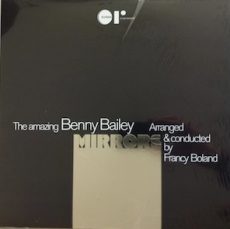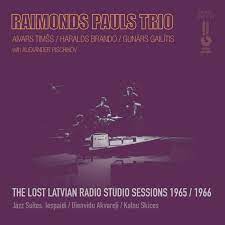
Daily Dose Of Jazz…
Anthony Frank “Tony” Inzalaco, Jr. was born January 14, 1938 in Passaic, New Jersey. From childhood drumming he went on to obtain bachelor’s and master’s degrees from the Manhattan School of Music. He was active in the United States from 1959 to 1968, performing and/or recording with Vinnie Burke, Jaki Byard, Donald Byrd, Chris Connor, Maynard Ferguson, Jim Hall, Roger Kellaway, Morgana King, Lee Konitz, Morris Nanton, Duke Pearson, Benny Powell, Buddy Rich, Charlie Shavers, Johnny Smith, Billy Taylor, and Ben Webster.
Moving to Germany in 1968 he lived there for a decade as a member of the bands of Kurt Edelhagen and Eugen Cicero. He worked with Benny Bailey, Don Byas, Kenny Clarke and Francy Boland, Kenny Drew, Art Farmer, Dizzy Gillespie, Dexter Gordon, Johnny Griffin, Peter Herbolzheimer, Carmen McRae, Sal Nistico, Horace Parlan, Fritz Pauer, Oscar Peterson, Idrees Sulieman, Ben Webster again, Jiggs Whigham, Jimmy Woode, and Leo Wright during his time in the country.
After moving back to the States, he was active principally in Boston, Massachusetts in the 1980s, working with Byrd, Griffin, and Farmer again, as well as with Ruby Braff, Al Cohn, and Dakota Staton.
Relocating again to Los Angeles in the 1990s, drummer Tony Inzalaco has led his own ensemble for the past decade.
More Posts: bandleader,drums,history,instrumental,jazz,music

Daily Dose Of Jazz…
Ojārs Raimonds Pauls was born January 12, 1936 in Iļģuciems, Riga, Latvia and is the second child of a glass blowing factory worker and a seamstress. His father played drums and his grandfather played the violin, and following in his grandfather’s footsteps he is enrolled into Riga’s institute of Music kindergarten branch. Being too young and his fingers unfit for playing violin, he started on the piano.
By 1943 he was studying at Riga’s 7th Elementary school while continuing piano lessons with professor Valerijs Zosts and teachers Emma Eglīte and Juta Daugule. 1946 saw Raimonds admitted to the Secondary Musical School of Emīls Dārziņš, combining his studies at the elementary school for three years.
When he turns 14, Pauls was playing piano at restaurants and clubs with a violin and saxophone virtuoso Gunārs Kušķis. Five years later he completed his studies at the Riga’s 7th Elementary school, however, during this time, he independently developed a liking for playing jazz by studying and imitating various jazz records.
He would go on to compose for musicals, ballets, theater performances, puppet shows, films, choirs, and instrumentals, He has received several honors from his home country, the USSR, Sweden, Japan and Armenia.
Composer, arranger and pianist Raimonds Pauls, who was the Minister of Culture of Latvia from 1988 to 1993, continues to record and perform.
More Posts: arranger,bandleader,composer,instrumental,jazz,music,piano

Daily Dose Of Jazz…
Waymon Reed was born on January 10, 1940 in Fayetteville, North Carolina and attended the Eastman School of Music. He went on to play with trumpeter/saxophonist Ira Sullivan. Joining James Brown’s band from 1965 to 1969, he played on It’s a Man’s Man’s Man’s World.
Reed worked with the big bands of Frank Foster and Thad Jones-Mel Lewis. He became a member of the Count Basie Orchestra in 1969, staying until 1973. He returned to play with Basie again in 1977–78.
He married Sarah Vaughan and worked with her from 1978–80, but shortly afterwards they divorced. He played on B.B. King’s album There Must Be A Better World Somewhere in 1981. In 1977, Reed recorded his one album as leader, 46th and 8th, featuring tenor saxophonist Jimmy Forrest, pianist Tommy Flanagan, bassist Keter Betts and drummer Bobby Durham.
Trumpeter Waymon Reed, who was principally a bebop soloist, transitioned from cancer on November 25, 1983 in Nashville, Tennessee.
More Posts: bandleader,history,instrumental,jazz,music,trumpet

Daily Dose Of Jazz…
Cees See was born on January 5, 1934 in Amsterdam, Netherlands. He worked in the 1950s with Freddy Logan and Jack Sels, however by the early Sixties he was performing with Rolf Kühn, Pim Jacobs, and Herman Schoonderwalt. He also played with an ensemble formed for Sender Freies Berlin, whose members included Herb Geller and Jerry van Rooyen.
In the second half of the 1960s he played with Teddy Wilson, Klaus Doldinger, Volker Kriegel, Dusko Goykovich, Nathan Davis, and Jan Hammer. He was a member of the New Jazz Trio with Manfred Schoof and Peter Trunk from 1970 to 1972. In the early 1970s he continued to work with Kriegel and Goykovich, as well as with Wolfgang Dauner and Chris Hinze.
Drummer Cees See transitioned on December 9, 1985 in The Hague, Netherlands.
More Posts: drums,history,instrumental,jazz,music

Daily Dose Of Jazz…
Judd Proctor was born Procter on January 2, 1931 in Doncaster, Yorkshire, England. He played banjo in his youth and joined a local trio, but switched to guitar in his teens. He won a regional Melody Maker contest in a group, The Zetland Players. By the age of 18 he was conscripted into the Royal Air Force, where he met and was influenced by guitarist Ike Isaacs. After his military service ended, he worked in accountancy for British Rail, but soon left to join a dance band in Nottingham and became a professional musician.
After playing in various bands he joined Ray Ellington’s quartet in 1955, remaining for six years. He appeared on many radio broadcasts including The Goon Show. The early Sixties saw Proctor become a session musician, appearing on recordings by Cliff Richard, Helen Shapiro, The Springfields, Cilla Black, Serge Gainsbourg, Harry Nilsson and many others. In his later years he worked with the Benny Goodman Orchestra. He recorded some instrumentals under his own name, including the 1961 single Palamino/Nola, and a 1968 LP, Guitars Galore.
Judd appeared on many television shows with Ella Fitzgerald, Sammy Davis Jr., and Victoria Wood, and on many film soundtracks. The 1960s through the ‘80s had him touring with Stanley Black, a member of the Don Lusher Orchestra, and with the Bert Kaempfert Orchestra. His last and longest regular gig was providing incidental music for the TV comedy series Last of the Summer Wine.
Guitarist and session musician Judd Proctor, whose name was often misspelled on early recordings, transitioned on August 21, 2020 in Market Deeping, Lincolnshire, England at the age of 89.
More Posts: bandleader,guitar,history,instrumental,jazz,music


